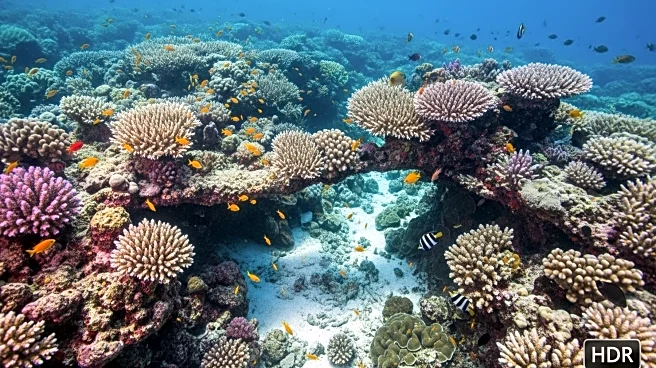What is the story about?
What's Happening?
A new report from the University of Exeter and international partners has revealed that the world's warm-water coral reefs have crossed a critical thermal tipping point due to rising ocean temperatures. This development marks the first Earth system to reach such a threshold, with 84.4% of coral reefs experiencing bleaching-level heat stress since January 2023. The report, released ahead of the 30th annual UN Climate Change Conference, underscores the urgency of addressing global warming to prevent further damage to these vital ecosystems. Coral bleaching occurs when higher ocean temperatures force corals to expel the symbiotic algae living in their tissues, leading to a loss of color and essential nutrients. While bleached corals can recover if temperatures cool, the increasing frequency and severity of bleaching events are reducing recovery chances.
Why It's Important?
The crossing of the thermal tipping point for coral reefs has significant implications for marine biodiversity and the global environment. Coral reefs are crucial for supporting marine life, protecting coastlines, and providing resources for millions of people. The loss of these ecosystems could lead to a decline in fish populations, affecting food security and livelihoods. Additionally, coral reefs play a role in carbon sequestration, and their degradation could exacerbate climate change. The report calls for urgent action to mitigate emissions and enhance carbon removal to stabilize global temperatures, emphasizing the need for international cooperation to preserve coral reefs.
What's Next?
As global leaders prepare for the UN Climate Change Conference, the report aims to influence negotiations and drive meaningful action to curb global warming. Scientists are exploring strategies to protect and restore coral reefs, including genetic modification to improve resilience and efforts to reduce pollution and destructive fishing practices. However, these measures alone cannot counteract the effects of rising temperatures. The report stresses the importance of stringent emission mitigation and enhanced carbon removal to maintain functional coral reefs. The scientific community is urged to engage with stakeholders to implement tangible steps to save reefs from further loss.
Beyond the Headlines
The report highlights the ethical and economic challenges of coral reef conservation. While genetic modification offers some hope for preserving species, the feasibility of applying such solutions on an ecosystem scale remains uncertain due to limited funding. The loss of coral reefs also raises cultural concerns, as many communities rely on them for traditional practices and tourism. The report calls for a holistic approach to conservation, integrating scientific research with community engagement and policy development to address the multifaceted impacts of coral reef degradation.

















